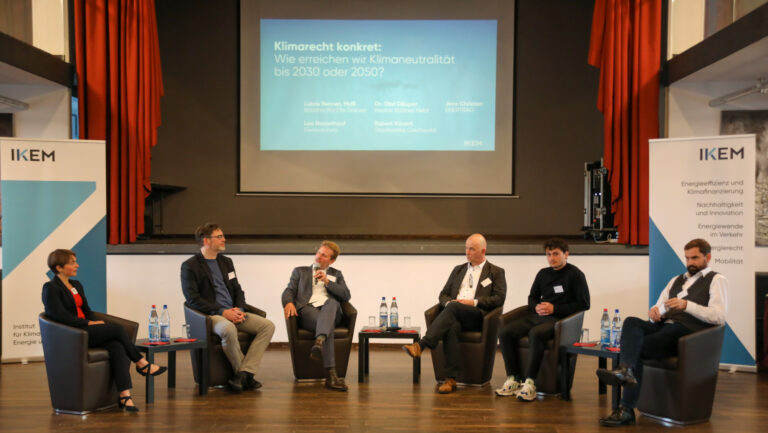At IKEM’s annual conference, participants explore the boundaries of a new field
Experts in economics, law and the social sciences discussed the new field of climate law at IKEM’s Annual Conference 2021 in Greifswald. The conference made it clear that, because climate change affects every aspect of life, combatting it will require a holistic approach. Climate law provides one such approach by integrating multiple priority areas – climate change adaptation and climate change impacts – into one field. This demands a new way to systematise relevant legislation.
Professor Michael Rodi, executive director and director of research at IKEM, addressed this development in his opening remarks. So far, the field has lacked a definitive book on the topic, he said. ‘That’s the idea behind our new handbook on climate law, Handbuch Klimaschutzrecht. For the book, we worked with around 40 authors to map out the entire field of climate law.’ Rodi pointed to this topic as a crucial gap in legal training. ‘Climate law and energy law are not part of the traditional law curriculum,’ he said. ‘We want to change that, which is why we’ll create a course of study on this topic over the next few years.’
Dr Michael Mehling, a professor at the Massachusetts Institute of Technology (MIT) and the University of Strathclyde School of Law, followed Rodi’s opening speech with a presentation on developments at the international level. After providing a general overview of international climate law, he discussed his expectations for COP26 in Glasgow. Heading into the conference, the status of climate efforts is clear, he said: ‘the vast majority of parties are not doing their fair share to mitigate climate change and comply with the Paris Agreement.’ He noted various obstacles to more aggressive action, describing some of these as political – such as disputes over Article 6 of the Paris Agreement – and others as largely technical, such as the role of market mechanisms in mitigation efforts.
Professor Claudio Franzius of the University of Bremen observed that climate law is not only intertwined with other disciplines, but also with other fields of law. ‘It’s no longer possible to clearly distinguish between international law and national law,’ he said in his remarks on the new field. ‘The differences between EU and international law are also starting to blur.’ Nevertheless, Franzius argued, states can move forward unilaterally on climate change mitigation – and should do so, without waiting for binding requirements to be imposed under international law. States that wait to act, he said, are either naïve or attempting to stall progress on climate change.
The Interdisciplinary Centre for Baltic Sea Region Research (IFZO) held the first workshop of the afternoon, which featured Professor Mehling, Professor Birgitte Egelund Olsen (Aarhus University, Denmark), Dr Farid Karimi (Novia University, Finland) and Judith Kärn (IKEM/IFZO). The speakers examined legal developments in the Baltic Sea Region, with a particular focus on public acceptance of climate change mitigation measures. Professor Birgitte Egelund Olsen presented the Danish ‘toolbox’ of legal incentives to increase acceptance of renewable energy innovations. Among other measures, she introduced the financial compensation of homeowners, which is closely connected to a new legal instrument that enables the closest neighbours to sell their property to developers if the property loses value due to the construction of wind turbines or solar farms. Residents in the immediate vicinity of the plant also receive annual monetary compensation from plant owners, said Egelund Olsen. Based on the Danish experience, she recommended the use of simple, predictable instruments that would promote a more positive view of the energy transition’s local impact.
Professor Michael Sauthoff, a member of the IKEM Advisory Board and retired president of the Higher Administrative Court and Fiscal Court, spoke about the influence of climate law on construction planning law and related decision-making processes. He described the central role of municipalities in mitigation efforts and outlined the many options available to them in the context of planning law and regional planning. Local governments need the capacity to implement these options, he said, adding that in Berlin, for example, ‘the capacity is not always available.’
The final panel included Lukas Benner (Member of the German Bundestag, Green Party), Lea Nesselhauf (GermanZero), Dr Olaf Däuper (BBH), Robert Kauert (Stadtwerke Greifswald) and Jens Christensen (ENERTRAG), who discussed concrete measures and targets for climate change mitigation in Germany. ‘If we set a goal to be climate neutral by 2035, that would be a goal based on science – and one that doesn’t need to be constantly changed and adapted,’ said Nesselhauf in a discussion of Germany’s target date for climate neutrality. The focus is different at the local level, explained Kauert. ‘As a municipal utility, we don’t look at long timeframes, but at what the legal framework will allow,’ he said. If the legislature took local circumstances into account, there would already be significant progress in this area, he argued: for example, if wind turbines were not shut down, Greifswald could produce a large portion of its heat through power-to-heat processes.
IKEM’s Annual Conference made it clear that climate law is an important subject at local, national, European and international levels and is relevant to scientists as well as representatives of business, politics and civil society. The conference highlighted this wide-ranging significance and made a crucial contribution to the topic by sketching out the contours of the emerging field.

Presentations
- Prof. Dr. Franzius: Klimarecht im Mehrebenensystem
- Dr. Karimi: Energy Transition in the BSR: Overview of Research Activities
- Prof. Dr. Egelund Olsen: Perspectives from Denmark on Climate Law and Policy
- Judith Kärn: Perceptions of Nord Stream 2 - between energy security, climate policy and national energy policies


